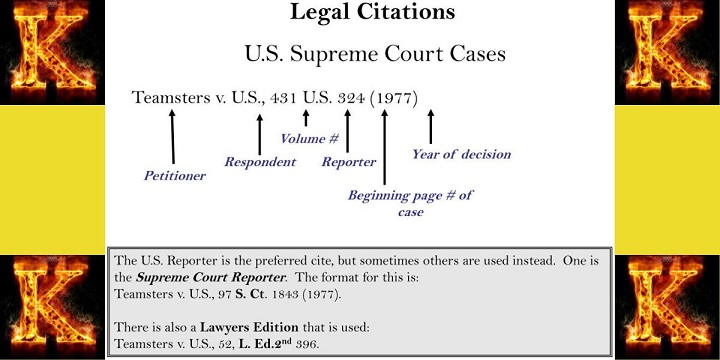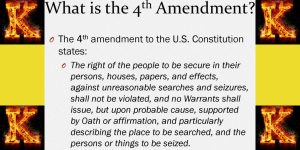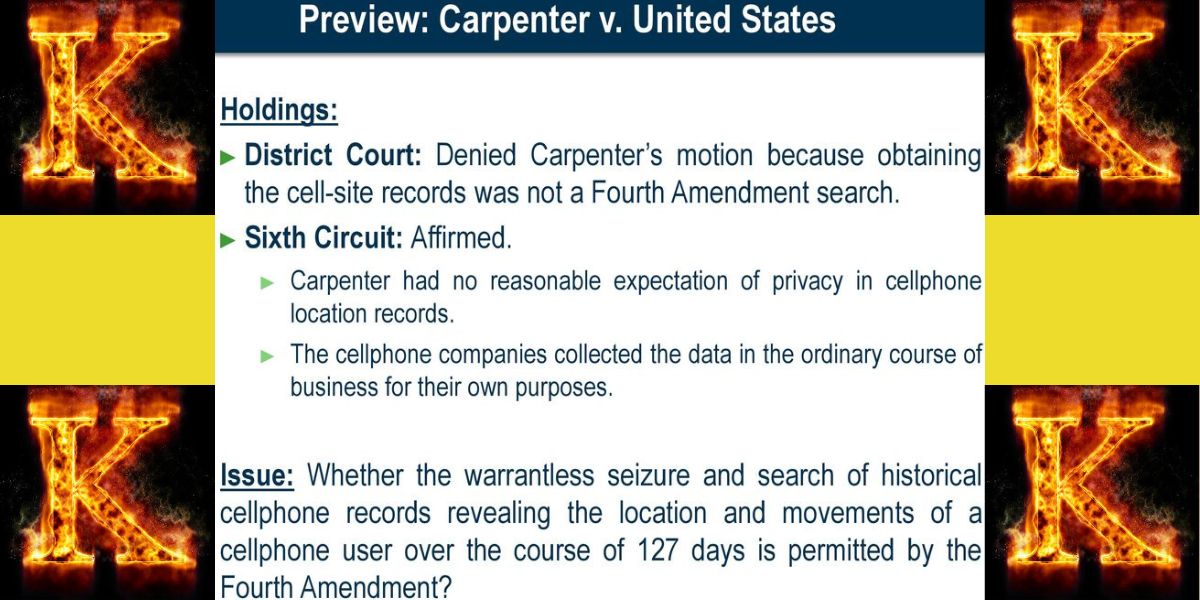Introduction
In technology, questions surrounding privacy and government authority under the Fourth Amendment have become increasingly complex. Alan Z. Rozenshtein's article, "Fourth Amendment Reasonableness after Carpenter," delves into these complexities, particularly in light of the landmark case of Carpenter v. United States. In this case, the Supreme Court ruled that acquiring cellular site location data (CSLI) without a warrant violated Fourth Amendment rights. This review critically assesses Rozenshtein's analysis and explores its implications within the framework of Fourth Amendment jurisprudence, especially in the digital age. Additionally, it evaluates the compatibility of Rozenshtein's insights with Christian principles, highlighting the ethical dimensions of Fourth Amendment reasonableness.
Description of Fourth Amendment Reasonableness after Carpenter
Rozenshtein's article offers a comprehensive exploration of Fourth Amendment reasonableness in the digital age, particularly in the aftermath of the
Carpenter v. United States case. Here's a breakdown of the key elements addressed:

Issue Addressed:
- Focus on Reasonableness: Rozenshtein's analysis delves into the concept of reasonableness concerning searches and seizures, especially in the digital sphere. Central to this discussion is the examination of CSLI and its implications post the Carpenter ruling.
- Implications of Carpenter Decision: The article scrutinizes whether the Carpenter case represents a significant departure from established Fourth Amendment jurisprudence. It aims to decipher how this landmark ruling shapes the evaluation of government actions' reasonableness within the digital landscape.
- Examination of CSLI and Its Ramifications: The article meticulously examines Cellular Site Location Information (CSLI) and its implications following the Carpenter v. United States ruling. This examination is crucial for understanding the evolving landscape of digital privacy rights and government surveillance practices.
- Evaluation of Carpenter Case's Significance: Rozenshtein's analysis critically evaluates whether the Carpenter case signifies a departure from established Fourth Amendment jurisprudence. This evaluation involves scrutinizing the nuances of the ruling and its potential implications for future legal precedents.
- Assessment of Government Actions' Reasonableness: One of the central aims of Rozenshtein's analysis is to decipher how the Carpenter ruling shapes the evaluation of government actions' reasonableness within the digital landscape. This assessment involves considering the balance between security concerns and individual privacy rights in light of technological advancements.
- Impact on Legal Frameworks: The article explores how the Carpenter decision influences the interpretation and application of Fourth Amendment principles in the digital age. This includes analyzing the precedents set by the ruling and the potential shifts in legal standards for evaluating government conduct.
- Intersection of Technology and Constitutional Rights: Rozenshtein's analysis highlights the intersection of technology and constitutional rights, particularly in the context of digital privacy. By examining the implications of the Carpenter ruling, the article sheds light on the evolving dynamics between technological advancements and legal protections.
- Complexities of Digital Privacy: Through its focus on CSLI and digital privacy issues, Rozenshtein's analysis navigates the complexities of protecting individual privacy in an increasingly digital world. This involves grappling with questions of data collection, surveillance practices, and the scope of government authority.
- Relevance for Legal Scholars and Practitioners: The insights offered in Rozenshtein's analysis are relevant not only for legal scholars but also for practitioners navigating Fourth Amendment issues in the digital age. By unpacking the implications of the Carpenter ruling, the article provides valuable guidance for interpreting and applying constitutional principles in contemporary legal contexts.
In summary, Rozenshtein's analysis addresses a multifaceted array of issues related to reasonableness, digital privacy, and governmental authority, offering nuanced insights that contribute significantly to the ongoing discourse in legal and academic circles.
Underlying Assumptions:
- Necessity of Adaptation to the Digital Age:
- Rozenshtein's analysis operates under the assumption that Fourth Amendment principles cannot remain static but must evolve to address the challenges posed by modern technology.
- It acknowledges the imperative of upholding fundamental rights, such as privacy, in the face of advancements in surveillance technology and digital data collection.
- The assumption recognizes that the legal framework must adapt to the realities of the digital age to effectively safeguard individual liberties while allowing for legitimate governmental interests.
- Balancing Government Duty and Individual Privacy:
- The analysis acknowledges the delicate balance between the government's duty to uphold security and the protection of individual privacy rights.
- It recognizes that advancements in technology present challenges to maintaining this balance, as government surveillance capabilities expand alongside increasing concerns about privacy intrusion.
- Rozenshtein's analysis assumes that navigating this balance requires careful consideration of both governmental responsibilities and individual rights, particularly in an era of heightened security concerns and rapid technological advancement.
- The assumption underscores the complexity of balancing security imperatives with the protection of civil liberties in an increasingly interconnected and technologically reliant society.
Conclusions and Recommendations:
-
Significance of Carpenter Ruling:
- Rozenshtein's assertion regarding the Carpenter ruling's significance reflects a deep understanding of its implications for Fourth Amendment jurisprudence.
- The Carpenter decision marks a pivotal moment in legal history, particularly concerning digital privacy rights, as it establishes a precedent for protecting individual privacy in the digital age.
- The ruling underscores the importance of recognizing and safeguarding digital privacy rights as integral components of Fourth Amendment protections.
- It highlights the need for legal scholars, policymakers, and practitioners to acknowledge the evolving nature of privacy rights in response to technological advancements.
-
Integration of Mosaic Theory:
- Rozenshtein's advocacy for the integration of the "mosaic theory" into the assessment of government actions' constitutionality in the digital realm reflects a nuanced understanding of privacy law.
- The mosaic theory recognizes that individual data points, when aggregated, can paint a comprehensive picture of an individual's life, thereby implicating privacy interests.
- Advocating for a comprehensive evaluation that considers the cumulative impact of individual data points aligns with the need to adapt legal frameworks to address the complexities of digital privacy.
- By advocating for the integration of the mosaic theory, Rozenshtein emphasizes the importance of adopting a holistic approach to assessing government actions' constitutionality in the digital sphere.
- This approach acknowledges the interconnectedness of digital data and the potential for cumulative data collection to infringe upon individual privacy rights, necessitating a reevaluation of legal standards.
-
Implications for Legal Practice and Policy:
- Rozenshtein's recommendations have significant implications for legal practitioners and policymakers, urging them to consider the broader implications of digital privacy rights in their decision-making processes.
- Legal practitioners must adapt their strategies to account for the evolving landscape of digital privacy law, incorporating principles such as the mosaic theory into their arguments and defenses.
- Policymakers are called upon to enact legislation that reflects the changing understanding of digital privacy rights, ensuring that laws effectively protect individuals in the digital age while balancing legitimate governmental interests.
- These recommendations underscore the need for ongoing dialogue and collaboration between legal scholars, policymakers, and practitioners to address the complex challenges posed by digital privacy rights effectively.
In summary, Rozenshtein's conclusions and recommendations provide valuable insights into the implications of the Carpenter ruling for Fourth Amendment jurisprudence and digital privacy rights. By advocating for the integration of the mosaic theory and recognizing the significance of the Carpenter ruling, Rozenshtein contributes to ongoing discussions about privacy rights and legal standards in the digital age.

Additional Context:
-
Ongoing Debates:
- The article is situated within a context of ongoing debates surrounding privacy and security in the digital age, reflecting the heightened awareness of individuals' digital privacy rights and concerns.
- Examples such as the United States v. Jones case serve as pertinent illustrations of the challenges posed by government surveillance and the intricate interplay between privacy and security interests.
- These ongoing debates underscore the relevance and timeliness of Rozenshtein's analysis, as it addresses pressing issues at the forefront of contemporary legal discourse.
- The article contributes to these debates by providing nuanced insights into the implications of legal decisions, such as the Carpenter ruling, for individual privacy rights and governmental authority.
-
Backdrop of Legal Landscape:
- Rozenshtein's analysis is contextualized within the broader legal landscape, which encompasses precedents and discussions surrounding the impact of technology on privacy rights.
- The analysis acknowledges the evolving nature of legal standards and principles in response to technological advancements, reflecting a dynamic legal environment.
- By considering the backdrop of the legal landscape, Rozenshtein's analysis provides a comprehensive understanding of the significance of the Carpenter ruling and its implications for future legal debates.
- The broader context highlights the need for legal scholars and practitioners to adapt to the changing technological landscape while upholding fundamental principles of privacy and individual rights.
- Furthermore, the analysis sheds light on the complexities of navigating privacy rights within a digital context, emphasizing the importance of striking a balance between privacy protections and legitimate governmental interests.
-
Implications for Legal Discourse:
- The contextualization of Rozenshtein's analysis within the broader legal landscape underscores its relevance for ongoing legal discourse surrounding privacy rights and governmental authority.
- By examining precedents and discussions within the legal landscape, the analysis offers insights into the trajectory of Fourth Amendment jurisprudence and the evolving understanding of digital privacy rights.
- The article prompts further exploration and discussion within legal circles regarding the implications of technological advancements for privacy rights and governmental surveillance practices.
- Overall, the contextualization of Rozenshtein's analysis within the broader legal landscape enriches understanding of the Carpenter ruling's significance and its broader implications for future legal developments.
Critique and Assessment from a Christian Worldview
Analysis:
- Alignment with Christian Worldview: Rozenshtein's analysis resonates deeply with the Christian worldview's emphasis on human dignity and individual rights.
- Balancing Governmental Authority and Civil Liberties: The analysis acknowledges the delicate balance required between governmental authority and civil liberties, which reflects biblical principles of justice and compassion.
- Ethical Considerations: Rozenshtein's examination of Fourth Amendment reasonableness within the context of digital privacy underscores the ethical considerations inherent in legal discourse, aligning with Christian principles.
Conclusions:
- Preservation of Individual Privacy and Dignity: Rozenshtein's conclusions align seamlessly with Christian values by emphasizing the paramount importance of preserving individual privacy and dignity.
- Rooted in Fairness and Accountability: The recommendations put forth by Rozenshtein are deeply rooted in principles of fairness and accountability, echoing Christian principles of stewardship and justice.
- Harmonizing Legal and Ethical Perspectives: The alignment of Rozenshtein's conclusions with Christian values highlights the harmonious relationship between legal reasoning and ethical considerations within the context of Fourth Amendment jurisprudence.
In summary, Rozenshtein's analysis and conclusions not only provide valuable insights into Fourth Amendment reasonableness but also offer a perspective that resonates strongly with Christian values, emphasizing the importance of preserving individual rights and maintaining ethical integrity in legal discourse.

Comparison with Christian Worldview:
- Alignment with Christian Values: Rozenshtein's analysis aligns closely with Christian values, advocating for ethical considerations in legal discourse. By emphasizing the importance of respecting human dignity and upholding justice, Rozenshtein's perspective resonates with Christian teachings.
- Ethical Integrity in Legal Discourse: The analysis underscores the necessity of ethical integrity in legal discussions, particularly in the context of technological advancements. This aligns with the Christian worldview's emphasis on righteousness and moral integrity.
- Intersection of Legal Reasoning and Christian Ethics: Rozenshtein's approach highlights the intersection of legal reasoning and Christian ethics. By integrating ethical reflections into legal analysis, Rozenshtein offers a holistic perspective that considers both legal principles and moral values.
Bible Verses and Ethical Reflection:
- Relevance of Biblical Verses: Biblical verses such as Romans 13:1 and Proverbs 24:27 provide ethical reflections on privacy, justice, and governmental authority. These verses resonate with Rozenshtein's analysis, emphasizing the importance of aligning legal reasoning with Christian ethics.
- Intersection of Legal Reasoning and Biblical Principles: The ethical reflections offered by biblical verses complement Rozenshtein's analysis, highlighting the intersection of legal reasoning and biblical principles. By drawing parallels between legal discourse and biblical teachings, Rozenshtein's perspective offers a comprehensive understanding of ethical considerations in the digital age.
Carpenter v. United States: Legal Analysis and Precedent:
- Significance of Carpenter Case: The Carpenter case underscores the significance of digital privacy rights under the Fourth Amendment. Rozenshtein's analysis explores the implications of this case, contributing to ongoing discussions about privacy in the digital age.
- Contribution to Legal Discourse: By analyzing the Carpenter case, Rozenshtein contributes to ongoing discussions about privacy rights and governmental authority. His analysis adds depth to the understanding of Fourth Amendment jurisprudence in the context of technological advancements.

Conclusion
Rozenshtein's article provides valuable insights into Fourth Amendment reasonableness in the digital era. Through a Christian lens, it highlights the importance of upholding human dignity and justice in legal discourse. This review deepens our understanding of the intersection between law, ethics, and technology.




